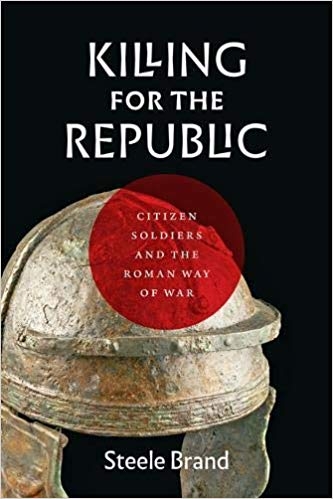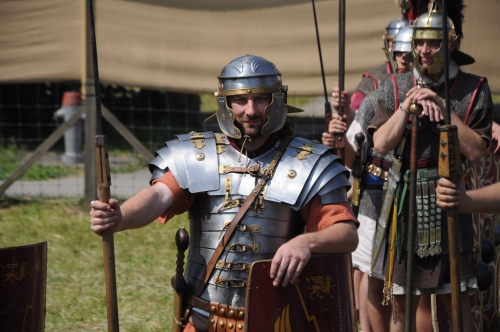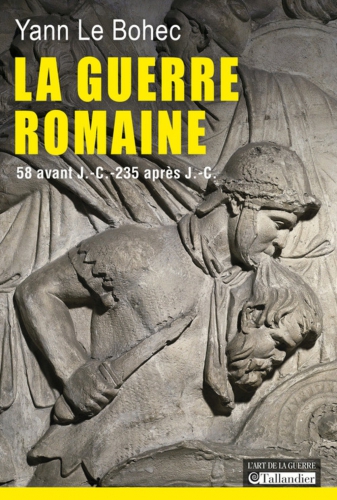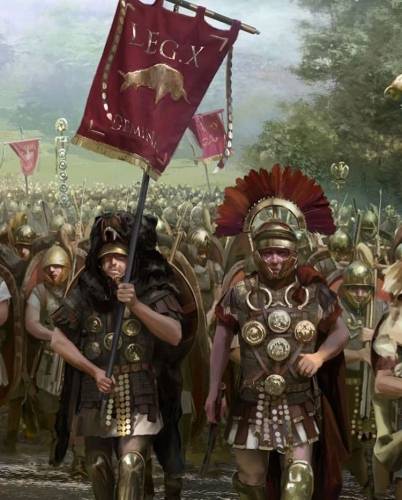jeudi, 16 janvier 2020
In Praise of Rome’s Citizen Soldiers
They fought for home and family, which was preferable to professional mercenaries only in it for the emperor's spoils.
Steele Brand is a historian who pays not even lip service to historical determinism. The Roman Republic collapsed, Brand says, because of deliberate choices made by “grasping, ambitious and amoral” leaders who took advantage of a debased “culture” that became more “perfectly suited to autocracy” than to freedom. Brand’s book should be read with care by Americans as our republic enters its twilight, as the ambitions of our political class replace the traditions of our ancestors.
Readers of many tastes will receive great enjoyment from Brand’s book. For those interested in general history, Brand provides a readable, engaging political history of the Roman Republic from the Roman kings to the rise of Augustus. He overlays a fascinating account of the development of Roman military strategy, tactics, weaponry, and chain of command, as well as providing detailed accounts of some of the most important battles of the Roman Republic, such as Sentinum, New Carthage, Pynda, Mutina, and Philippi. He also opens a window into the public spiritedness, or “civic virtue,” of the typical soldier of the Republic, who loved Rome, not out of greed or ambition, but because it protected his “little platoon,” his family and his farm. Fighting for the things these soldiers loved concretely made them particularly lethal.
 The book, moreover, is stocked with well-selected quotes from great writers and historians of the time, such as Livy, Plutarch, Polybius, and Cicero, who were contemporaries of, or even participants in, the greatest events of the Republic. I have read all these authors, though I must admit that Brand gave me new appreciation for their writings by placing them firmly in their historical context.
The book, moreover, is stocked with well-selected quotes from great writers and historians of the time, such as Livy, Plutarch, Polybius, and Cicero, who were contemporaries of, or even participants in, the greatest events of the Republic. I have read all these authors, though I must admit that Brand gave me new appreciation for their writings by placing them firmly in their historical context.
What’s really not to be missed in the book are the last 100 pages, which provide a riveting account of the vicious political jockeying and outright civil wars that came in the wake of the assassination of Julius Caesar. While the historical events of the 1st century B.C. are not analogous to America’s current political turmoil, i.e. Donald Trump is not Julius Caesar, there are recognizable character flaws common to both the men who were willing to overthrow the Roman constitutional order and our current hubristic political class.
The Roman and American situations run parallel in that republics fall apart when the ambitions of amoral actors create such partisan rancor that they create competing claims of “legitimacy.” When political opponents become existential outlaws or are seen as wholly illegitimate, the nation slouches toward civil war. Here in America, magnanimity in politics is replaced by viciousness. And in the 1st century B.C., questions of political legitimacy put the Roman army into play: “At a time when Roman soldiers were being given conflicting information about who was legitimate, any commander became fair game for desertion, betrayal, or assassination if he behaved incompetently or failed to look out for their interests.”
Refreshingly, Brand is a partisan for the Roman Republic. He believes that a mixed regime, with both popular and aristocratic elements, is far preferable to vesting all political power in an emperor. And he believes that a citizen-soldier army that fights for its farms and families is preferable to a professional, mercenary army that fights for the booty dispensed by that emperor. Julius Caesar, he says, “deserves his place in history alongside other great generals like Cyrus, Alexander, Attila, Genghis Khan, Cortés, and Napoleon, but like them, he was nothing short of a monster.”
Brand ominously points out that most of the Framers of the U.S. Constitution, as well as Thomas Jefferson, were fans of the great Roman republican figures, such as Brutus and Cicero, while Americans today are more likely to be fans of Caesar, who is “admired as an exemplar of courage, decisiveness, skill, genius, and good fortune.” It is somewhat disconcerting that the American imagination now prefers the one to the other.
Finally, while Brand acknowledges that the Roman Republic sometimes pushed other people around, its constant warfare seems not to have been a general symptom of imperialism but a historical necessity. “During the time frame in which Rome rose to power,” he writes, “international state systems were declining or totally absent, and anarchy and lawlessness were at their peak. Law, justice, order and peace were impossible to maintain in a Hobbesian world where every state was as militaristic as the next.”
Unlike post-Cold War America, where a foreign invasion is unthinkable, the Roman Republic had been viciously sacked by the Gauls and nearly destroyed by Hannibal in the Second Punic War. For most of the Republic’s existence, “forever war” was a necessity, not a choice; in the contemporary American case, forever war is not a necessity, but a choice.
That said, when the virtue of many of the leading figures in Rome became debauched, the presence of a large military was undoubtedly a factor in the demise of the Republic. When the Republic displayed a crisis of legitimacy, the army turned on itself and “these citizen-soldiers were no longer killing for the Republic. They were killing it.”
There is a parallel danger in contemporary America. We now have a gigantic military-intelligence-industrial complex that seems to question the legitimacy of a duly-elected president and is willing to scheme unconstitutionally for his demise. A large-scale politicization of our huge national security establishment would be an ominous development indeed. When the ethos of that national security community has degenerated from the nonpartisan statesmanship of a George Marshall to the scheming partisanship of a John Brennan, it is apparent that the recovery of genuine statesmanship is the only thing that can save us from the Roman Republic’s fate.
William S. Smith is research fellow and managing director at the Center for the Study of Statesmanship at The Catholic University of America. His latest book is Democracy and Imperialism, published by the University of Michigan Press.
00:37 Publié dans Histoire, Militaria | Lien permanent | Commentaires (0) | Tags : histoire, rome, rome antique, antiquité romaine, légion romaine, humanités gréco-latines |  |
|  del.icio.us |
del.icio.us |  |
|  Digg |
Digg | ![]() Facebook
Facebook
mercredi, 16 décembre 2015
Yann Le Bohec, historien de «La guerre romaine»

Yann Le Bohec, historien de «La guerre romaine» (58 avant J.-C. – 235 après J.-C.)
Tallandier (collection L’art de la guerre, 2014)
Ex: http://cerclenonconforme.hautetfort.com
Le constat de l’auteur est sans appel : l’armée romaine a été l’armée la plus efficace de l’Antiquité. Voire peut-être même de l’histoire. Avec cette synthèse claire et détaillée venant couronner quarante années de recherches, Yann Le Bohec, l’un des plus grands spécialistes de la Rome antique et de son armée, nous livre un travail précieux dont l’intérêt est loin de n’être que strictement historique. L’histoire est enseignements et lorsque l’on voit le piteux état de nos forces armées aujourd’hui, on se dit que l’Etat-major serait fort avisé d’aller prendre quelques leçons chez les anciens… En cinq chapitres couvrant tous les aspects de la guerre romaine, Yann Le Bohec explore l’armée comme institution, sa stratégie, sa tactique, son environnement et surtout la manière dont les Romains vivaient et percevaient la guerre. Leur psychologie, basée tant sur la religion que sur le droit, est en effet un élément fondamental pour comprendre comment ils sont arrivés à une telle excellence dans l’art de guerroyer.
L’armée romaine de l’empire a bien sûr trouvé ses bases dans l’armée républicaine mais a été changée en profondeur par Auguste. En plus de faire de l’empereur le chef suprême de l’armée, celui-ci en fit une armée permanente, professionnelle et sédentaire. Impressionnante par ses effectifs (plus de 300.000 hommes en 23), l’armée ne l’était pas moins par son recrutement de qualité. N’étaient sélectionnés comme légionnaires que des hommes libres choisis après un examen approfondi de leurs aptitudes, de leurs compétences et de leur morale : le dilectus. Ces citoyens étaient la colonne vertébrale d’une armée qui comptait en plus de ses légionnaires bien d’autres unités auxiliaires employant des alliés de Rome ou des étrangers. Les affranchis et les esclaves ne furent employés que dans des cas extrêmes car, dans les mentalités de l’époque, ils étaient considérés comme indignes de porter les armes... Cet aspect qualitatif du recrutement n’était pas la seule force de l’armée. L’encadrement des soldats en était le second pilier. Il était dû à une hiérarchie efficace, formée et toute dévouée au service de l’Etat. D’origine sénatoriale ou équestre, les officiers étaient tenus de montrer leur virtus en offrant le meilleur d’eux-mêmes. C’est une réelle culture de l’exemple. Il est donc essentiel de le souligner : les valeurs romaines sont indissociables de la manière dont la guerre est pensée et vécue. La fides et l’honneur en sont les clés de voute. La valeur individuelle du combattant et son comportement au combat s’allient à la discipline collective. Cette dernière était si importante dans l’armée qu’elle avait même été divinisée à partir d’Hadrien! La discipline se retrouvait dans l’exercice que les Romains considéraient presque comme une science. Mêlant sport, exercices individuels ou collectifs (dont les manœuvres et mouvements étaient le but ultime), l’exercice était vu comme le moyen de garantir le bon comportement du soldat à la guerre ainsi que son obéissance totale. La conclusion est simple : le légionnaire romain est un guerrier de qualité extrêmement bien préparé à la guerre, tant physiquement que moralement.
 La qualité de l’armée romaine venait aussi de sa polyvalence et de sa capacité d’adaptation à toutes les situations. A l’aise dans toutes les formes de combat, elle n’a jamais hésité à emprunter aux autres peuples ce qui pouvait parfaire son efficacité. L’héritage grec fut ici aussi fondamental, notamment en ce qui concerne la poliorcétique (l’art du siège). Par ailleurs, l’armée romaine se caractérisait par une tactique de combat où rien n’était laissé au hasard. La logistique, les services, le génie, le renseignement, la santé et les transmissions avaient été développés comme dans aucune autre armée de l’antiquité. La stratégie, à savoir la mise en œuvre des divers moyens de gagner, était très étudiée et les conflits étaient préparés par des actions politiques ou diplomatiques et s’appuyaient sur une économie prospère.
La qualité de l’armée romaine venait aussi de sa polyvalence et de sa capacité d’adaptation à toutes les situations. A l’aise dans toutes les formes de combat, elle n’a jamais hésité à emprunter aux autres peuples ce qui pouvait parfaire son efficacité. L’héritage grec fut ici aussi fondamental, notamment en ce qui concerne la poliorcétique (l’art du siège). Par ailleurs, l’armée romaine se caractérisait par une tactique de combat où rien n’était laissé au hasard. La logistique, les services, le génie, le renseignement, la santé et les transmissions avaient été développés comme dans aucune autre armée de l’antiquité. La stratégie, à savoir la mise en œuvre des divers moyens de gagner, était très étudiée et les conflits étaient préparés par des actions politiques ou diplomatiques et s’appuyaient sur une économie prospère.
Bien loin d’être le peuple belliqueux que certains ont pu décrire, les Romains considéraient la guerre comme un mal nécessaire et non une fin en soi. L’auteur démontre d’ailleurs que, contrairement à une idée tenace, Rome n’a jamais eu de projet impérialiste à proprement parler. Elle a mené des guerres tant défensives qu’offensives au gré des circonstances et sans réelle préméditation ou plan d’ensemble. Pourquoi alors faisait-on la guerre ? Les raisons étaient multiples (politiques, sociales, économiques, militaires) mais souvent liées à la psychologie collective : la peur de l’ennemi ; la protection de Rome (patriotisme) ou d’alliés de Rome ; le goût de la domination ou du butin… Une certaine passion immodérée de la guerre a bien sûr toujours existé et des personnages comme César ou Trajan en sont les plus emblématiques. Les Romains ont certes pu déclencher des guerres d’agression sous des prétextes fallacieux mais de nombreux exemples démontrent leur volonté de limiter et de réguler les conflits. Ils considéraient d’ailleurs la guerre civile comme l’horreur absolue... Idéalement, la guerre devait être juste (Cicéron) et limitée (les Stoïciens) mais, une fois commencée, elle devait être victorieuse coûte que coûte, quel qu’en soit le prix. En effet, la victoire amenait la paix et donc la prospérité, la felicitas, sur le peuple romain. N’oublions pas que la victoire, dans les premiers temps de Rome, avait été divinisée… La religion était indissociable de la guerre. Les soldats étaient très pieux et participaient, au sein des garnisons, à de nombreuses cérémonies religieuses. La religion était omniprésente, qu’on pense aux présages des dieux avant le combat (les auspices) ou à toutes ces cérémonies qui bornaient le temps militaire et lui donnaient un réel « rythme sacral ». La fin des campagnes, en octobre, était ainsi l’occasion de trois cérémonies de première importance : l’equus october (course de char), l’armilustrium (purification des armes) et la fermeture des portes du temple de Janus afin de retenir la paix, vue par les Romains comme l’état le plus positif qui soit.
La grande qualité de l’ouvrage de Yann Le Bohec réside non seulement dans l’exhaustivité de son propos (vous apprendrez tout sur la vie quotidienne des soldats, leurs équipements, le détail des différentes unités ainsi que sur l’histoire de l’armée en tant que telle) mais aussi dans la réflexion qu’il mène sur la guerre à partir de multiples exemples historiques ou philosophiques. Objectif, il montre bien que cette armée puissante et organisée avait également ses faiblesses. A partir du 3ème siècle, la conjoncture défavorable pour l’empire accompagnée de l’oubli progressif des préceptes qui avaient fait son efficacité dans le passé sonneront peu à peu le glas de la grande armée romaine.
Rüdiger / C.N.C.
Note du C.N.C.: Toute reproduction de cet article doit mentionner la source.
00:05 Publié dans Histoire, Militaria | Lien permanent | Commentaires (0) | Tags : histoire, rome antique, légion romaine, militaria, histoire militaire, antiquité romaine |  |
|  del.icio.us |
del.icio.us |  |
|  Digg |
Digg | ![]() Facebook
Facebook



